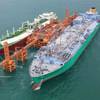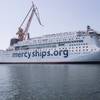By Richard B. Fairbanks, President,
American Salvage Association
A riddle: How many years, and how many Administrations does it take for an esteemed U.S. government agency to publish regulations that have likely already been written? The answer is 13 years and five Admirals.
Thirteen surely is an unlucky number for the professional marine salvage industry in the United States, for it has, indeed, taken this many years for the United States Coast Guard to publish its proposed salvage regulations (to amend 33 CFR Part 155, Salvage & Marine Firefighting Requirements), which, after all this time, have once again been postponed for three more years. The future of these proposed regulations is as difficult to predict as the weather. The Oil Pollution Act of 1990 was the legislative response to a major shipping casualty within our borders. The Act mandated that ships carrying oil cargoes have plans in place to respond to accidents "just in case". The legislation envisaged that ships would have both salvage contractors and oil spill clean up contractors "standing by". The United States Coast Guard was quick to provide oil spill clean up regulations but has yet to implement salvage regulations. Will it take another catastrophe to get them enacted?
In 1982, the National Research Council concluded that "The Congress should update the national statement of salvage policy (10 USC 7361-7367, Salvage Facilities Act of 1948) to recognize the vital role that salvage plays in minimizing the public consequences of maritime casualties, and to harmonize the Salvage Act with the laws on intervention and pollution response" (NRC, 1982). Despite that recommendation, there has been no change in the national salvage policy in the last decade."
According to the National Academies of Science in 1982, the nature of salvage has changed in the last decade. At least four major trends have been observed:
1. The motivation for maintaining a salvage capability has shifted from a private concern protecting the vessel and its cargo to a more public or societal interest in protecting the environment and economy from impacts of a vessel casualty.
2. The traditional dedicated salvage company, with fully integrated capabilities has disappeared. Each has had to quit the business or supplement its income by utilizing its salvage assets and experienced personnel in more conventional marine business. Salvage has become "part time".
3. Compensation for salvage has not kept pace with either the changing roles of the salvor or the increased financial risks.
4. The salvor no longer is in charge of the decision-making process employed in responding to a marine casualty, particularly one involving pollution or the threat of pollution. Instead, the salvor's role is to assist and provide direction to a Unified Command System (UCS) involving the federal government, state government(s), and the responsible party (vessel or cargo owner or designee).
"As a result of these trends, the U.S. salvage capability today is found in a small number of professional salvage companies, some dealing only with a specialized and limited aspect of salvage." the Academies concluded. In the early 1980s when the Research Council urged a national salvage policy, the thought of terrorists flying planes into our nation's most stalwart structures was far from the reality of what would happen in New York and Washington two decades later. Now that we've lived such attacks, we are fore warned about the stated vulnerabilities of the marine transport sector, be they in ports, terminals or aboard ships.
"According to the General Accounting Office, roughly a third of all terrorist attacks worldwide target transportation systems," says Chet Lunner, Assistant Administrator in the Office of Maritime and Land Security, Transportation Security Administration. Those of us in the industry have become well familiar with the nightmare scenario of a laden ship exploding or sinking in a major ship channel, blocking a port, shutting it down for weeks. The economic consequences are dire. Pre planning for an efficient and professional response to such a disaster is essential. Captain James R. Wilkins III, Supervisor of Salvage & Diving for the U.S. Navy, recently said, "A robust salvage community is not just of economic interest to the country - it's a matter of national defense." This country needs a National Salvage Policy and we need it now. This need for such a policy has been known for many years, but has taken on particular urgency since the terrorist attack on September 11th, 2001 when the salvage industry (Weeks Marine Company and others) were immediately called upon to help transport people from the chaos of New York and to quickly build barging terminals to remove the millions of tons of mangled steel and debris from Ground Zero.
Just like OPA 90's effectiveness in reducing oil pollution from ships in the wake of a ship casualty in Prince William Sound, there is little argument today against the need to protect national security, ensure minimal disruption to the U.S. economy resulting from marine casualties, minimize environmental impacts due to pollution from marine casualties, and to protect public safety in the aftermath of September 11th.
In all fairness to the Coast Guard, this agency has assumed a number of roles out of the water since the attacks in September 2001. Few may know that the Coast Guard was called upon to assist when Anthrax was discovered in mailrooms in Washington, DC, to aid in the recovery efforts after Hurricane Isabel, and most recently, to lend assistance in the Ricin scare at the U.S. Capitol. These examples point up the expanded mission of the Coast Guard to include homeland security overall, while trying to maintain marine security a top priority.
Currently the U.S. Coast Guard Captains of the Port are developing, reviewing, and updating Area Maritime Security plans as required by the Secretary of Homeland Security. Marine salvage response in the event of a terrorist attack against a maritime target is a critical consideration in the development of any security effort. Salvage companies, through the American Salvage Association, have offered their support in creation of those security plans.
"The threats from terrorism facing the U.S. today constitute a new reality that has created a strategic demand for a robust salvage industry as a key component of national security," wrote Coast Guard Captain Joseph Saboe, from whose desk these proposed regulations will be launched
We in industry continue to wait for publication of the final rule. We also continue to work within our own ranks to make the industry safer. For example, ASA has created an independent set of safety standards for the professional salvage industry for adoption both in the Americas and internationally. While recognizing existing international salvage safety standards, the objective of ASA's Salvage Safety Standards is to further ensure safety at sea, prevent human injury and loss of life, avoid damages to the marine environment, and preserve property. These Standards are the primary source of reference for the conduct of all operations in a salvage/wreck removal operation and will be used in conjunction with ASA's member companies' own safety standards and practices, as well as existing, accepted legislative mandates.
ASA's Standards include such areas as site safety and health plans; daily briefings and reporting; vessel equipment inspections; subcontractors; salvage master's logs; and roles and responsibilities of salvage teams. There is also a focus on salvage diving safety requirements.
Well trained and ready to respond, it is our belief that the U.S. salvage community, as private sector first responders following any future terrorist attacks against the U.S. maritime domain, will prove extremely beneficial in minimizing damage and expediting recovery. The future need for salvors in a post-attack situation will most likely require a combined effort by the salvage community, as opposed to an individual salvage company response. By bringing the salvage community to the Coast Guard maritime security table will ensure that all parties will be cognizant of plans of action and better equipped to respond.
Finalizing the current proposed salvage regulations would help to create the National Salvage Policy that the National Research Council asked for over 20 years ago. It is needed by this country. The salvage community stands ready, willing and able to assist the United States with matters of maritime protection, casualty response planning, vessel and cargo salvage, marine environmental protection, wreck removal and harbor clearance.
We in the marine industry should urge the Coast Guard to publish the proposed regulations and provide a reasonable answer to the riddle that has everyone puzzled, but no one laughing.
Richard B. Fairbanks is President of the American Salvage Association
Subscribe for
Maritime Reporter E-News
Maritime Reporter E-News is the maritime industry's largest circulation and most authoritative ENews Service, delivered to your Email five times per week










